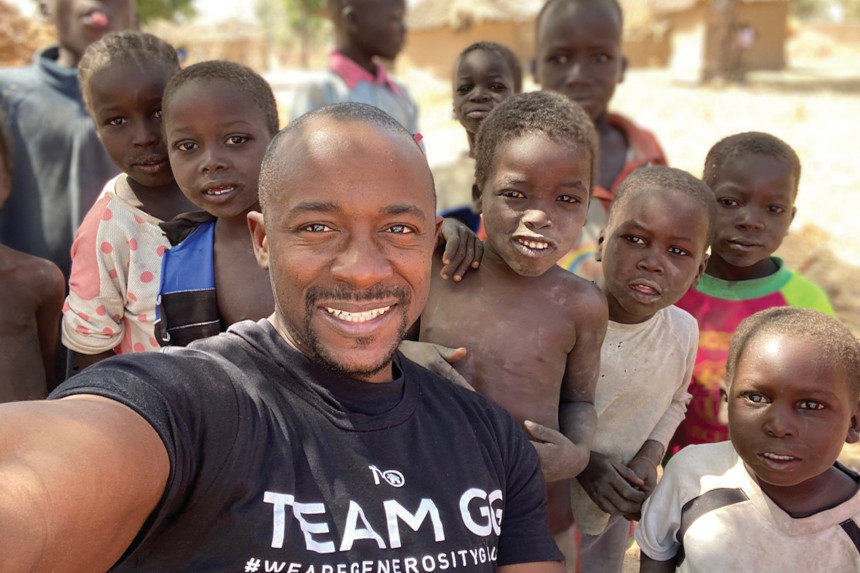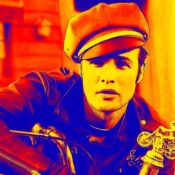On a bustling Selfless Saturday in Baltimore, the smell of home-cooked spaghetti and barbecue rises from aluminum bins below an I-95 overpass. Rich Akwo, the monthly event’s founder, mingles with nearly 400 homeless men and women as they receive their hot lunch, though Selfless Saturday offers far more than food. Some attendees take showers in a truck equipped with private stalls. Others receive haircuts, sip coffee, or sift through racks of clothes. Many accept not only toiletries and snacks from roughly 100 volunteers, but drug counseling, job advice, and mental health services.
“To receive a haircut, to receive a shower, to receive a clean set of clothes — it’s dignity restored,” says Akwo, founder of the nonprofit Generosity Global. “One homeless man told me a mac-and-cheese dish reminded him of how his grandmother used to cook. He was emotional. We have many stories like that where people have hope again because they know that someone actually cares.”
Over the past ten years, Akwo and his organization (initially called Friends of the Homeless) have served Selfless Saturday meals to 40,000 people, provided more than 1,000 free haircuts, and distributed more than 10,000 pounds of clothes and 5,000 personal hygiene kits. Akwo feels a strong connection to the individuals he serves because he too has endured emotional and financial struggles.
In 1996, when he was 13, his family immigrated to Silver Spring, Maryland, from Cameroon. The abrupt loss of family and friends was painful — and his culture shock was profound. On his first day of school, he was stunned when a fellow student cussed out a teacher.
“Growing up in Africa, you were very disciplined — kids respected teachers,” he says. “Everything was different here. I was disconnected from everything that I knew. I cried every day.”
Despite longing for his old life in Cameroon, Akwo slowly adjusted, and in 2005 he graduated from the University of Maryland, Baltimore County, with a degree in biopsychology. But he possessed an entrepreneurial spirit and decided to start his own business. The transition was rocky. “I got involved in real estate, and let’s just say it did not go as planned,” he says.
“To receive a haircut, to receive a shower, to receive a clean set of clothes — it’s dignity restored.”
For about three months, he lived in his car and occasionally slept at friends’ houses. He also worked the night shift as a hotel parking valet. Across the street, homeless individuals gathered and slept in an office building plaza. Despite his own struggles, Akwo talked with them and gave them cash.
“I got to see their world,” he says. “I got to see how difficult it was for somebody to earn $10 to buy food. I got to see the personal hygiene challenges, the emotional challenges. I saw how people don’t look at them as human beings. That was the inspiration for me to give back.”
Akwo’s financial situation improved when he started a house-cleaning business. He got married and soon launched what became Selfless Saturday. The first event occurred on Christmas Eve 2010. Akwo and his wife, Erika, collected 40 coats and 40 blankets, along with some food, and distributed the items to the homeless.
“Within 10 minutes, everything was gone, but there was still this big line of people,” he says. “And so we made a commitment that every month, we would come out with as much food as we can buy and invite friends. More people started noticing what we were doing, and they wanted to help and volunteer and give back.”
The event grew quickly, a fact which Sheena Saydam, a Generosity Global board member and managing partner of Saydam Properties Group in Washington, D.C., attributes to Akwo’s determination and compassion. “Nothing stops him,” she says. “He can bond with anyone, no matter their background. In this moment where people feel like we’re such a separated nation, come to Selfless Saturday and you’ll see how we all come together for this one mission.”
One of Generosity Global’s most successful programs is the mobile shower truck, which sprang from Akwo’s brief bout with homelessness. When he worked as a parking valet, he would bathe himself with a washcloth in the hotel bathroom. Many homeless individuals can go weeks or months without a shower, and they often discussed the problem with Akwo on Selfless Saturdays.
“They would say, ‘You feed us good. You give us clean clothes. You give us haircuts. But look at me. I still stink. I can’t go on a bus. People look at me differently,’” Akwo recalls. The showers in homeless shelters are typically grimy and unsafe, particularly for women. “Women have reported being molested, being raped, being attacked because there is no security in those showers. But without good personal hygiene, homeless individuals can’t go on job interviews.”
After raising funds to buy the shower truck, the organization introduced Generosity Shower in 2019. The truck appears not only at Selfless Saturday but three days a week throughout the city from March through October. Staff clean and disinfect the stall after each shower and provide towels, clothes, and kits that include toiletries such as soap and shampoo. For the homeless, it’s more than a shower. It’s a rare opportunity for comfort.
“You go in there, you lock the door, you have that moment to yourself,” Akwo says. “People have told me, ‘It’s the best shower I’ve ever taken. I feel restored.’ We’ve had a couple of individuals who have taken a shower right before a job interview.”
Akwo’s generosity also extends to his native Africa. Several years ago, on a trip home to Cameroon, he visited a clinic and met a young girl who was dying from dysentery and diarrhea. The cause: contaminated drinking water. Roughly 785 million people worldwide lack access to clean drinking water, including 320 million in Africa.
“I couldn’t ignore this,” Akwo says. “If we can provide clean water, then we can help decrease the number of people, especially kids, getting sick.”
In 2015, Friends of the Homeless became Generosity Global, and the organization has launched 19 well-water projects in Cameroon, delivering clean water to more than 36,000 people. Akwo is working to raise $20,000 so that Generosity Global can purchase its own drilling rig, which would allow them to dig about 90 wells a year. The five-year goal: To bring clean drinking water to 2 million people. (Generosity Global also works in Kenya and offers educational programs for women.) The work continues in the United States as well. Akwo intends to buy more shower trucks, increase the schedule to five days a week in 2021, and launch Selfless Saturday events in other cities.
“When you can go into a community in Africa and see women, men, and children celebrate because they no longer have to walk miles and miles to get clean drinking water; when you see how homeless people’s faces light up from something as simple as a shower, it’s gratifying,” he says. “We have to treat people as if they matter, because they do matter. When we do that, when we live a life that is filled with generosity, that’s how I define success.”
Ken Budd is the author of The Voluntourist. His work appears in the 2020 edition of the Best American Travel Writing.
This article is featured in the March/April 2021 issue of The Saturday Evening Post. Subscribe to the magazine for more art, inspiring stories, fiction, humor, and features from our archives.
Featured image: Many happy returns: Rich Akwo visits his native Cameroon. His own experiences with poverty informed his mission to help others. “I got to see their world,“ he says. (Courtesy Generosity Global)
Become a Saturday Evening Post member and enjoy unlimited access. Subscribe now




Comments
Mr. Akwo is the most amazing, selfless man I’ve ever read about. He’s experienced the indignities of all those he’s helping first hand himself. Dignity in life is crucial. I applaud his success, and know he’s just getting started on what’s to come for millions in need!